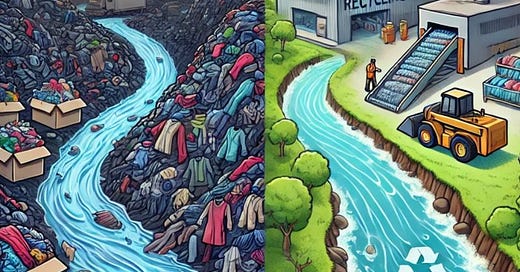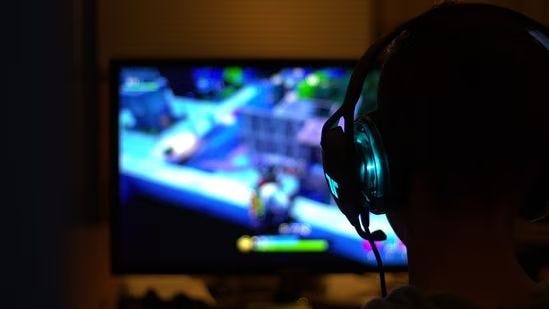Are video games bad for you?
Plus, vulture deaths led to human deaths in India, microwaves aren't actually sterile, and the complicated truth about recycling clothes.
Welcome back to the newsletter, everyone!
A lot has happened since I posted so I’ll get to the personal stuff first. If you’re interested in the science, you can do the equivalent of skipping an ad on a video by scrolling down to the next section below.
I was in India and Thailand most of last month. Since returning from my trip to Bangkok (which I now regard as the world's top food city for non-vegetarians) I've been recuperating from a bout of illness and the inevitable jetlag, alongside catching up on work.
It was awesome to see my book, When The Drugs Don’t Work: The Secret Pandemic That Could End Modern Medicine at airport bookstores at also at popular spots in Bangalore, where I even got to sign a few copies. Seeing your work out in the wild is a special moment, especially since my last book on COVID-19 was released during the travel-restricted days of the pandemic.
For those that missed out, When The Drugs Don’t Work is available wherever fine books are sold, including Amazon. 😊
I'm deeply thankful to everyone who participated in the book talk in Bangalore, especially the experts—Prof. Amit Singh, Prof. Dipshikha Chakravortty, and Dr. Samay Pande—as well as the moderator Prof. Thomas Issac. A special thanks to Dr. Shweta Ramdas for inviting me. 🙏🏽
I’m also pleased to share that the book has garnered more positive reviews in the popular press. Here’s the link to a recent review.
Now, let's dive into the latest developments in the world of science…
Are video games bad for you?
People have talked about the supposed negative effects of video games on mental health for years, but what does science actually say?
A recent study by Hiroyuki Egami and his team in Japan challenges the long-held belief that gaming is bad for mental health.
Earlier, the link between video gaming and mental health was flimsily based on observational studies, but the bizarre circumstances of supply chain issues during the COVID-19 pandemic unexpectedly provided a chance for a fascinating natural experiment in Japan.
Here's what happened. With gaming consoles like the Nintendo Switch and PlayStation 5 in high demand but short supply, Japanese retailers decide to resort to lotteries to decide who could buy one.
People who won the lottery had the opportunity to purchase and use a game console, while those who didn’t win served as a control group. This random distribution allowed researchers to isolate the effects of owning and playing video games on mental well-being from other confounding variables, such as pre-existing mental health conditions or socioeconomic status.
So what did they find? Analyzing data from nearly 100,000 participants over two years, they found that those who played more video games actually saw small but statistically significant improvements in mental health and life satisfaction. The benefits were especially notable among players using the Nintendo Switch. PlayStation 5 owners also reported reduced psychological distress.
That said, the study has some limits. The benefits declined for those playing more than three hours a day (as we would expect), and the data was collected during the pandemic which was a time when stress and isolation were high. These factors likely amplified gaming’s positive effects since people sought ways to relax and connect with others
Also, the study didn’t differentiate between game genres, which could have different effects on mental health. And it didn't address the potential downsides of excessive gaming.
So where do we go from here? More studies are needed to understand how different games and gaming habits impact mental health over time. But what drew me to the study as an outsider was how a rare event allowed creative researchers to design an experiment to test a long held assumption.
As I read these findings, I feel a bit relieved myself: maybe my own son's time on the Switch isn’t so bad. But do I really want to share this research with him? School is back after the summer break this week. The last thing I need from him is a wisecrack that he’s boosting his mental health by playing video games, when he should be doing his homework!
Vulture decline lead to more than five lakh deaths in India
In the 1990s, India witnessed a dramatic decline in its vulture populations. Without these natural scavengers, dead animals were left to decompose in the open, significantly increasing the spread of disease-carrying pathogens.
Recent research highlights a staggering impact. The disappearance of these birds may have contributed to the deaths of over half a million (five lakh) people from 2000 to 2005. This example underlines the need to save animals for the sake of human health and the severe consequences that can arise from ecological imbalance.
Can we recycle our way out of the environmental crisis?
The short answer is “no” though in the case of recycling clothes the longer answer is that it depends.
The textile industry weaves a thread of environmental havoc, much of which goes unnoticed by the average consumer. Annually, about 100 billion garments are produced globally, with most ending up in landfills within a year. Historically, garments were worn and mended over many years, but as global affluence increases, so does textile waste.
The textile industry demands significant resources, including large quantities of water and energy, primarily from fossil fuels. This contributes to considerable environmental damage, including greenhouse gas emissions and water pollution from untreated chemical wastewater. Making one cotton t-shirt requires over 2,700 liters of water—equivalent to one person's drinking water for 2.5 years! The industry is also responsible for 20% of global water waste and 10% of carbon emissions.
Synthetic fibers, particularly polyester, now represent about half of the fiber market. These synthetics, derived from fossil fuels, are non-biodegradable and pollute the environment. Despite this, less than 1% of textiles are recycled due to a lack of incentives.
A new study offers some hope. A team at the University of Delaware created a method to recycle mixed fabrics using microwave-assisted glycolysis. This method effectively separates and recycles fibers like polyester and cotton, and may change how we handle textile waste. Their method can break down polyester in just 15 minutes, even with fabrics that have undergone various treatments. The work was published in Science Advances.
Recycling can be part of a broader strategy that includes repairing and reusing clothes. Yet, we should harbor no illusions that we can recycle our way out of the current mess. There’s no substitute for limiting consumption.
The inconvenient truth is that the viability of large-scale recycling is currently uncertain. Recycled materials are more expensive to produce than virgin fibers.
The failure of Renewcell, a company that pioneered chemical textile recycling, illustrates this point starkly. Renewcell created Circulose, a material derived from recycled cotton waste. Their factory in Sweden was capable of recycling up to 120,000 metric tons of cotton waste annually.
Despite partnerships with major brands, Renewcell filed for bankruptcy this year. The company blamed its unprofitability on the underutilization of its recycling capacity. Despite outward pledges by fashion brands to sustainability, most were hesitant to commit to using recycled materials!
Deadly microbes hide out in microwaves!
Researchers have found that microwave ovens, commonly believed to kill all microbes, actually host robust microbial communities. Microwave ovens in households, offices, and labs are nurturing communities of bacteria, including potential pathogens and extremophiles—organisms that thrive under extreme conditions. Swabbing and analyzing 30 microwaves, scientists identified bacteria strains that can withstand microwave radiation and high temperatures, such as Bacillus and Staphylococcus, which are frequently found on human skin. S
—
That’s it for this week… Take care and clean that microwave!
Anirban






Wait what? So Microwave? Should I use? Can I somehow antibacterial wash it? Think I should shoulld subscribe to nature mag now :-(
On the video game and the fatherly concern, how does switch and ps5 differ ? 😅 I have PS5 and I also have a kid-daughter ( Though the game time on holidays is still hardly an hour) but that plus occassional phone makes me concerned (ps5- not that much)